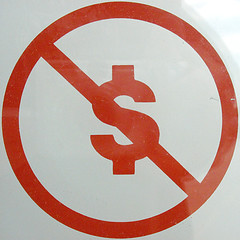Archive for April, 2009
Freelance Writing Week II: Should Freelance Writers Ever Write for Free?
Welcome to Day 2 of Freelance Writing Week II!
Yesterday’s topic, in case you missed it, was:
How Much Do Freelance Writers Make?
 Now from a rather tame subject to an extremely volatile one. How volatile you ask?
Now from a rather tame subject to an extremely volatile one. How volatile you ask?
Well if you’re ever at a party and want to break the ice with a freelance writer, just ask:
Should Freelance Writers Ever Write for Free?
And then stand back. Far.
Many experienced freelancers will say you should never accept non-paying or extremely low paying assignments with the reasoning that, hey, this is your *job* and no one expects the plumber to come over and fix your toilet for free! And even if freelance writing isn’t your full-time job, you should still be compensated for your services.
On the other hand, beginning freelancers, i.e., those without any clips, generally don’t see anything wrong with accepting jobs with no or low pay because hey, how else can you get started?
So who’s right?
I say they both are–at least to some extent.
Don’t Write for Free!
Generally, you should avoid writing for free as you are not only devaluing your own work (and telling potential future editors that your writing was worth nothing), but you’re also making it difficult for your fellow freelance writers to ask and receive a decent wage for their hard work.
This principle, by the way, also applies to extremely low-paying jobs ($5 or less for full-length articles is extremely low-paying in my book).
Is it *ever* OK to write for free?
I do think there are some excellent reasons to write for free, but the list is *extremely* short:
1. To Compile Clips (Maybe)
If you’re just starting out and haven’t been published anywhere, you *might* consider writing something for free just to get a clip or two under your writing belt.
But (and this is a *big* but) don’t make a habit out of it. It’s easy to get into a rut accepting non-paying or low-paying jobs, so set goals for your writing career and check in with them periodically to make sure you’re moving forward and not hovering in a bad place.
Even better than writing for others for free just for clips? Start yourself a blog and write “samples” of articles you’d like to eventually send to potential clients. It may be writing for free, but at least you’ll still own your material.
If your church or local community center needs a press release, flyer, or other written materials and you’re feeling charitable, this is a great way to give back and also hone your writing skills along the way.
Something like this may also lead to future paying work, so if you have the time and inclination, writing for free in this situation is a glaring exception to the “Don’t write for free!” rule.
3. Exposure
To be perfectly clear: I am *not* talking about all those job ads that say “We can’t afford to pay now, but you’ll get great exposure by writing for us!” Run from those. Fast. If they can’t make ad revenue to pay you, how do they possibly have enough readership to give you great exposure?!
What I mean is that if the New York Times calls you up to write an op-ed for free, you should seriously consider doing it, assuming you’ll get a byline (and preferably a link to your website!). If the publication asking for your free services is “important” enough and will, indeed, pay in exposure, it might be worth it to write for free.
If you’re a blogger, another example might be guest-posting at Darren Rowse’s Problogger; the link love and clicks over to your site alone could make your free writing worth the effort.
4. Promotion of Your Work
If you have written a book, for instance, and you can promote it by writing articles or blog posts, this is a good time to write for free–so long as you’re submitting to places who also cater to your target audience.
That’s my abbreviated opinion on the matter, but if you Google the topic, you’ll find lots more opinions, including:
- Do I Have to Write for Free to Get Started? Ask Anne, the Pro Writer at Anne Wayman’s About Freelance Writing
- Byline/Exposure/Bio in Lieu of Cash THE ULTIMATE INSULT TO WRITERS! at Angela Hoy’s Writers Weekly
- Want to Be a Travel Writer? Don’t Write for Free at Almost Fearless
Be sure to come back tomorrow for
“What’s the ‘Right’ Pay for Freelance Writing Jobs?”
If you haven’t already, be sure to subscribe through an RSS feed so you don’t miss a single Freelance Writing Week II post.
Also free free to bookmark, Stumble, and share these posts with friends via email, your blog, and Twitter. The more people we have reading them, the more ideas and suggestions we can come up with in the comments. We freelance writers have to stick together!
So what do you think about freelance writers writing for free
(or clients requesting that they do)?
Freelance Writing Week II: How Much Do Freelance Writers Make?
Welcome to Freelance Writing Week II!
If you’re just joining us, be sure to go back and check out the first Freelance Writing Week during which we discussed:
- Is Freelance Writing For You?
- Freelance Writing Resources
- 5 Tips for How to Find and Develop Your Freelance Writing Niche
- How to Find Freelance Writing Jobs: Query Letters
- How to Find Freelance Writing Jobs: Job Ads and Cold Calls
 All this week we’re going to talk about money. Coincidentally, the subject of the April newsletter of WOW is Money Matters so be sure to check it out for more great information on financial mistakes writers make, planning for retirement, surviving a recession as a freelance writer, and more.
All this week we’re going to talk about money. Coincidentally, the subject of the April newsletter of WOW is Money Matters so be sure to check it out for more great information on financial mistakes writers make, planning for retirement, surviving a recession as a freelance writer, and more.
First, the most important thing to remember is that freelance writing is a business, so be sure to treat it that way.
Your clients depend on you and expect you to deliver your assignments on time; you should expect to be treated fairly and paid on time as well. Just because you’re not sitting in an office doesn’t mean you’re not responsible for your work product or that a client doesn’t have to treat you with respect.
So, keeping in mind that freelance writing is a business, later in the week we’ll also talk about
- Whether you should ever write for free;
- The “right” pay for freelance writing jobs;
- How and when you can expect to be paid;
- How to tell if a freelance writing job offer is legitimate.
Today, though, I want to address something upfront. Although freelance writing has many advantages (e.g., working from home, the freedom to scheduling your own hours, choosing assignments that interest you), if you’re aiming to be a millionaire, well….
How much do freelance writers make?
Giving an “average” salary of a freelance writer is difficult, although there’s a great interview with Deb Ng of Freelance Writing Jobs at PayScale.com in which she discusses the issue. Deb quotes $1,000 to $2,000 a month as a common wage of many freelance web writers she knows; that’s about what I would think as well (keeping in mind, as Deb notes in the comments, that this interview was a few years ago so average wages may be a bit higher now).
So will I get rich freelance writing?
 Um, probably not. I’m a firm believer that anything is possible, but quite simply, a freelance writer making six figures is rather rare; some freelancers are in that income bracket, but they are the exception.
Um, probably not. I’m a firm believer that anything is possible, but quite simply, a freelance writer making six figures is rather rare; some freelancers are in that income bracket, but they are the exception.
Now don’t get me wrong: you can make a good living doing freelance writing and even support a family on it, but it takes a lot of work, commitment, dedication, and patience. And for many of us, the quality of life that freelance writing allows and the satisfaction of doing what we love and getting paid for it helps make up for the pay.
Can I expect that $1,000 to $2,000 a month from the get-go?
Unless you’re *extremely* fortunate, probably not. It can take years (that’s plural!) to build up to earning that amount per month depending on the kinds of credentials you have, so if you’re planning on eventually freelancing full-time, most people will recommend you keep your day job while you’re starting out and establishing contacts. Or, of course, have a generous savings account.
When I was testing the freelance waters 6 years ago, I did legal research and writing work in the meantime. I didn’t keep my day job per se, but I did continue doing similar work, only as a freelancer instead of an employee. To be clear, though, I’d *really* rather not relive those years again from a financial standpoint, and I wouldn’t have been able to do that if I had to support anyone in addition to myself.
I definitely would’ve had less stress had I just gotten a “regular” job and dabbled in freelancing, but for me personally, I didn’t want to waste any more time. I was ready to jump in and sink or swim. It took a while for me to swim, but overall I’m happy I did it this way.
Your road, of course, may look very different, so you’ll have to decide for yourself how to proceed.
Be sure to come back tomorrow for:
Should Freelance Writers Ever Write for Free?
If you haven’t already, be sure to subscribe through an RSS feed so you don’t miss a single Freelance Writing Week II post.
Also free free to bookmark, Stumble, and share these posts with friends via email, your blog, and Twitter. The more people we have reading them, the more ideas and suggestions we can come up with in the comments. We freelance writers have to stick together!
If you have money-related freelance writing questions, please leave them in the comments!
GoodReads: Social Media for Booklovers
 People often ask me whether I get bored living in a medieval village. I suppose plenty of others might under similar circumstances, but when I’m not working, I always manage to find something to do whether it involves dogs, goats, or engaging in one of my oldest and most favoritest hobbies: reading.
People often ask me whether I get bored living in a medieval village. I suppose plenty of others might under similar circumstances, but when I’m not working, I always manage to find something to do whether it involves dogs, goats, or engaging in one of my oldest and most favoritest hobbies: reading.
Over the Easter vacation, I devoured three books, and it felt wonderful since it’s been a while since I’ve had quality, concentrated reading time like that. What did I read?
- Too Much Tuscan Wine by Dario Castagno
- Love Walked In by Marisa de los Santos
- Waiting by Ha Jin
I loveloveloved the first, *really* liked the second, and just liked the third, but they are all definitely worth reading.
I will be writing a review of Dario’s book soon here on the blog (I promise, Dario!), but for the others and most other books I read, I tend to give quick summaries of my feelings over at GoodReads.
Do you know about GoodReads?
It’s yet another way to connect online, but this one is strictly for booklovers. You can share what you’ve read with your friends, give recommendations, and otherwise just talk about books.
If you want to be friends on GoodReads, I’m Michelle Fabio over there–or you can always keep up with what I’m reading and what I’ve read here on my books page.
So, have you read any good books lately?
Buon weekend!
Love Thursday: How to Leave Your (Teeth)Mark on the World
I’ve mentioned recently that P and I have a new garden spot. When we took it over about a month and a half ago, it was terribly overgrown so we spent many hours just getting it back to where it was no longer a jungle.
We pulled most of the weeds and unwanted greenery, but we also left a good amount for our kid, Pasqualina–she wanted to help out too.
And help she did, particularly one day when I spotted a cute heart-shaped leaf but was without my camera. I positioned the leaf by a lemon tree, ran home, got my camera, and came back to find this:
Obviously Pasqualina likes heart-shaped leaves too.
Does she look The Goat Who Ate the Heart-Shaped Leaf or what?
Happy Love Thursday everyone!
What’s Cooking Wednesday: Fried Mozzarella Sticks and Dipping Sauce
Today’s What’s Cooking Wednesday recipe is for those of you who think you have to go to a restaurant or buy the pre-packaged frozen version to enjoy fried mozzarella sticks. You don’t!
All you need is some good, fresh mozzarella and the usual items for breading, and you’re good to go.
What I made are actually disks not sticks, but that’s because our mozzarella comes in small balls, so I thought it would be easier just to work with it rather than try to make sticks.
You’re welcome to cut as you wish.
Fried Mozzarella Sticks
- Mozzarella
- Ingredients for breading listed in Breaded Veal Cutlets (see caveat below regarding measurements)
- Olive oil for frying
1. To prepare the mozzarella, cut it into sticks or disks; you can also buy pre-prepared sticks for this.
2. Dredge the mozzarella first in flour before dipping in egg and then the breadcrumb mixture. Unless you’re making a lot of mozzarella, you won’t need as much of the ingredients as listed in the cutlet recipe, so just play around with the measurements a bit until you get the right mix for your taste.
3. Fry breaded mozzarella in hot olive oil or vegetable oil if you like. Put enough oil in the pan so the sticks are about half-submerged. Let them fry for about 15 seconds on each side and then put them on paper towels to drain.
Fried Mozzarella Sticks Dipping Sauce
- 1 tablespoon olive oil
- 1 clove garlic, cut into a few pieces
- Small can of tomato sauce or canned tomatoes run through grinder
- 1/4 cup of water
- Oregano
- Salt and sugar to taste
1. Heat olive oil in small pan and then add garlic and saute for a minute or two, but don’t let it brown.
2. Add tomato sauce and water.
3. Add oregano, salt, and a pinch of sugar if you like, which can cut the acidity of the tomatoes.
4. Let simmer for about 15 minutes, stirring occasionally.
5. Serve hot alongside fried mozzarella sticks.
Buon appetito!



















